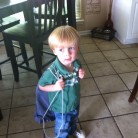Our youngest grandson, Jakson, is three. He also is a hitter. Now, in his defense, he’s small for his age. Lots of people, including his PoppyC, play rough and tumble with him, tickling, tackling, teasing. Sometimes the only way for him to get our attention or save himself from too much “picking” is a good kick to our shins or a whack to the jaw. I understand that. It is his way of saying, “Okay, you’re not listening to me. I’ve had enough.” But for some reason that doesn’t translate well in pre-school. Little Billy’s mom, sweet Susie’s mom don’t seem to have the same level of appreciation for Jakson’s communication techniques that I do.
So Ms. Rochelle came up with a great plan. She said, “Jakson, the next time that you get angry or frustrated or hurt to the point that you want to hit someone, I want you to stop, step back, and count to eight.” Apparently that’s making a difference and the side benefit is that Jakson has become a pretty proficient counter; at least until yesterday. Yesterday Jakson had just had enough. He was so frustrated that he was ready to knock Nick’s noggin off. But he dutifully stepped back and counted, “1-2-3-4-5-6-7-8.” Then he turned and said, “Ms. Rochelle, I need to count again ‘cause this is not working.”
There is a pretty good lesson there about life change I think. Not every resolution, every new commitment, every attempt at behavioral modification is going to work perfectly all of the time. I can’t tell you how many times I have decided to count calories, start my devotions earlier, or stop watching TV and it has lasted for a solid three days. We are creatures of habit and we yield to the path of least resistance. If you have set a worthwhile goal and you have a good plan then stay with it. There will be slips and setbacks but you start over again and keep doing the right thing. After all we all know that it takes 21 days to break a habit. Right?
Well, not exactly. There are chemicals in the brain called neuropeptides that carry data from one cell to the next. They are closely tied to our emotions so that piece of chocolate “comfort” cake has a whole history of “this will make you happier” connected with it. It takes a full 14 days to detox from those little feel good chemicals. To begin to replace them with a different set of emotions, “I really feel good when I fit into those pants,” takes 14 more days, and to allow our little “peptide” friends to settle in and become the guiding voice in our head takes another 14 days. We are talking 45 to 60 days to replace the emotional feelings we have about doing the unwanted things with the positive emotions of following the right path.
Apply that to a deeply seated behavior like pornography use or smoking or compulsive eating and you can imagine there will be a lot of starts and stops along the way. The secret is that we not give up. The 12 Step literature says, “We were constantly looking for a gentler, easier path.” Boys and girls, there just ain’t no easy way. You keep working your program, keep doing the steps, you keep stepping back and counting to eight as long as it takes and when you want to quit, you step back and count to eight again. The great news is that healing does come. God is faithful. We CAN change.
Real life change is always more of a process than an event. The Apostle Paul said, “Forgetting those things which are behind, I press on…” There is no better time to start than today. Decide what you want to do different. Determine how much better your life will be when that change takes place. Dedicate yourself to 45 days of action. And when you get really frustrated….say with me, “1-2-3-4….”

